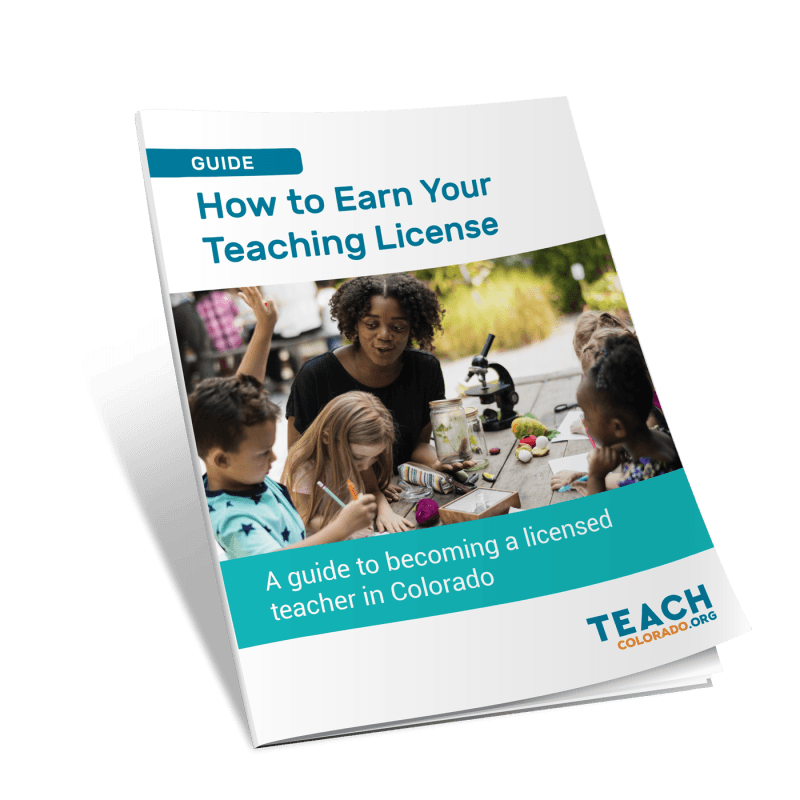Wondering how to become a teacher?
The right path will depend on your background, education and career experience.
On this page, we’ll go over each step you’ll need to take, plus answer some commonly asked questions about certification. Let’s dive in!
What’s in the Guide?
Now Playing
Overview: How to Earn a Teaching License
TEACH experts give you a simple overview of teacher licensure and answer some common questions. Those are the basics!.To get the details for Colorado, keep reading this page!
How to Earn Your Colorado Teaching License
- 1
Decide what you want to teach
When you enroll in a teaching program, you'll need to know the subject and grade level you want to teach. These will determine your licensure area.
Getting licensed in a shortage area such as early childhood education, science, special education or world languages can provide more opportunities and even higher pay!
- 2
Select & apply to a teaching program
Make sure to look for programs that match your education and background and offer the specific teaching license you want! Students need teachers from all backgrounds with all interests. Whether you already have a degree, have experience in a technical or industry setting such as welding or tech, or need to earn your bachelor's, there’s a teaching program that will fit your needs.
- 3
Get financial support for your teaching program
TEACH Colorado can help you reduce your teaching program costs! Apply for a TEACH Colorado scholarship, and use our Financial Aid Explorer to find grants, scholarships and other aid opportunities.
And some teaching programs will pay you to start teaching while you earn your license.
- 4
Pass required tests
As a future teacher, you’ll need to pass a few tests to show you’re ready to teach your own classroom. Getting licensed in Colorado usually includes one or more Praxis subject area exams.
You’ll usually take your exams around the time that you finish your teaching program.
Stressed about testing? You're not alone! Our Testing Guide covers everything from exam registration to study materials to what to expect on test day.
- 5
Apply for your teaching license
Almost there! Once you’re eligible, you’ll apply to the State of Colorado for a license. Don’t worry though, your teaching program will walk you through this part.
Now Playing
What Should You Teach? Teach What You Love!
The best, most memorable teachers are the ones who really love their teaching subjects! Whether you nerd out on languages or get excited about history, let your passion and experience be your guide.
Hear from teachers in Pre-K, science, language arts and more about why they love teaching.
Types of Teaching Subjects
Get the Full Guide

Sign up to download our Guide to Colorado teacher licensure to learn about specific subject areas and keep all the details handy. You can also visit our online Guide to Colorado Licensure Areas.
Degree Requirements to Teach
What is a teaching program?

Often called an “educator preparation program,” a teaching program helps you learn the ropes in a classroom setting.
Even if you know a lot about your subject, it can be hard to know how to teach it to others. It’s a special skill and it doesn’t always come naturally.
In your teaching program, you'll gain experience developing creative lessons, get practice in classroom management, and learn to tailor your lessons to the needs of a wide range of students.
Sign up to access our complete Program Explorer tool.
Types of Teaching Programs
About Alternative Licensure

If you have a degree, alternative licensure lets you start a teaching job while you complete an educator preparation program.
With an alternative teaching license, you can:
- Earn a salary while you complete your teaching program.
- Gain experience while you learn the tools of the trade.
- Finish a teaching program for less money and less time than a standard program.
Financial Aid Options
Find Financial Aid

Sign up for a TEACH Colorado account to search our database of scholarships, grants, fee reimbursements and more with our Financial Aid Explorer.
About Teaching Tests
To become a teacher, you’ll need to show that you know your subject well enough to teach it. Depending on the subject you want to teach, you can do this in several ways:
- Earn a bachelor’s degree in your teaching subject.
- Earn 24 college credits or more in your teaching subject with a grade of B or better.
- Pass a Praxis exam for your teaching subject.
Not sure which one makes most sense for you? Check out the information on the Colorado Department of Education’s site, or contact a TEACH Colorado advisor to get one-on-one advice.
Frequently Asked Questions
What’s next
Career Coaching in Colorado
Talk to an expert about how to become a licensed teacher in Colorado. Get free advice on what to teach and how to choose and apply to the right program.
Read MoreGuides in Colorado
Put your best foot forward when applying to teaching programs in Colorado. Reports & Guides deliver best practices for each step along the way, from studying for exams to applying for jobs and internships.
Read More